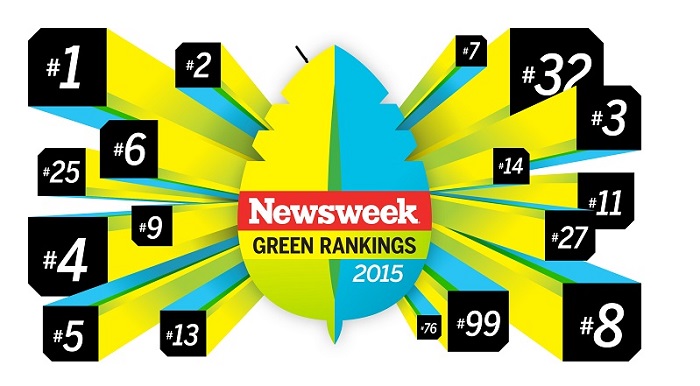American weekly news magazine Newsweek has come out with its annual rankings of the world’s largest companies on corporate sustainability and environmental impact, called the Newsweek Green Rankings. The 2016 rankings are based on eight key performance indicators that are used to assess and measure the environmental performance of the world’s largest publicly-traded companies. These indicators include combined energy productivity, combined greenhouse gas productivity, combined water productivity and combined waste productivity.
The number one company with a green score of 87.7% is Dublin-based Shire Plc., a global biopharmaceutical company known for developing attention-deficit drug Adderall. In recent years, Shire has worked to minimize its environmental impact. Since 2010, the company has reduced its paper usage by 22% and its landfill waste by 20%. The company has also increased its waste-diversion rate by 45%. In 2014, the company achieved carbon neutrality at all its North American facilities, a year ahead of its goal.
At number two is consumer products company Reckitt Benckiser Group Plc. with a green score of 83.9%. The company has set strict environmental risk-reduction targets for 2020, including zero waste-to-landfill, cutting water use by 35%, waste by 10% and energy by 35%.
Two telecommunication companies, the London-Based BT Plc and Switzerland-based Swisscom AG, follow at the third and fourth places, with green scores of 83.2% and 82.9%, respectively.
At number five is Essilor, a leader in ophthalmic optics. The company designs and manufactures extensive range of lenses, as well as equipment and services for eyecare professionals. Essilor’s products and services have a light environmental footprint, and they use technologies and processes that preserve natural resources and promote reuse and recyclability. The company applies the 3 Rs approach–reduce, recycle and reuse–as a pragmatic daily tool in improving materials, consumables and packaging. Their green score is 82%.
Nike is at the sixth place, with a green score of 81.9%. The footwear and apparel company has been working towards inventing closed-loop products and is moving to 100% renewable energy. Nike has seen an 18% decrease in carbon emissions per unit since 2011 and is setting aggressive targets to achieve a 25% decrease in carbon emissions per unit in key operations by 2020. Consumer goods giant Unilever and Sky Plc, Europe’s leading entertainment firm are at the seventh and eighth positions, with scores of 81.8% and 80.7%, respectively.
At number nine and ten are two industrial companies: Siemens AG and Schneider Electric SE with scores of 79.6% and 78.8%, respectively. Siemens aims to be the world’s first major industrial company to achieve a net-zero carbon footprint by 2030. Its goal is to cut carbon dioxide emissions–which currently total about 2.2 million metric tons a year–by half by as early as 2020. Schneider Electric, on the other hand, aims to bring products and solutions to the market that waste less energy and promote environmentally sound production and consumption. It’s committed to providing energy to the 1.1 billion people who have no access to electricity and provide sustainable economic development. Its goal is to achieve a carbon-neutral balance across all of its sites within the next 15 years.
There are a bunch of Indian companies that are also part of the green rankings. These include IT firms Tata Consultancy Services and Infosys, with ranks of 151 and 182 and scores of 56.10% and 52%, respectively. TCS’s initiatives towards environmental sustainability have created significant benefits for the organization, environment and community at large. Its target for 2020 include achieving 50% reduction in per capita Scope 2 emissions and reducing the carbon footprint (per capita) by 50%. Similarly, Bengaluru-based Infosys is pioneering new technologies while investing in measures to renew its existing infrastructure to improve performance and enhance resource efficiency. Read More


